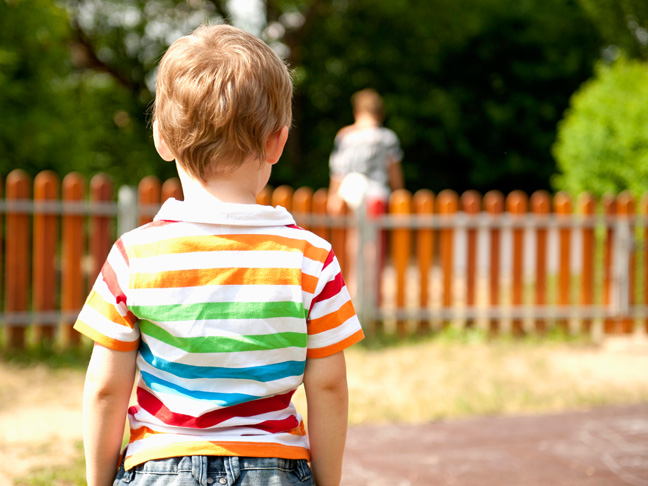Recently, my 6-year-old son and I were engaged in a kindergarten version of “kickball” (which seemed to literally translate to “kick the ball”) while we waited for his sister to finish school for the day. Ten minutes into our game two older boys (second graders) approached and asked him to join them in a game of two-touch against the wall, using my son’s ball. My gut screamed “no!” but he wanted to play with the bigger boys. About 30 seconds into two-touch the older boys told him he was out and ignored his requests for another turn.
He cried.
There is a significant difference between second grade and kindergarten when it comes to physical and emotional development. I consoled my son, asked for the ball back, and then chatted with the other boys. I asked them if the rules were different in second grade than they are in kindergarten, as I didn’t really understand the game. They were adamant that he was out and that was that.
They wanted his ball and they manipulated him to get it. Are they bullies? No. They’re just kids who wanted a ball and didn’t necessarily understand that a kindergarten student can’t quite keep up with a second grade student. Was their behavior unfriendly and lacking compassion? Yes.
The fact is that young children are just beginning to navigate the world of social interaction, and sometimes that leads to hurt feelings. That interaction reminded me that I need to work on developing my youngest child’s assertive skills, but those boys also need to work on how they interact with others. Starting a game with three but kicking one out indefinitely isn’t very social.
The good news is that, although these moments can be hard for both kids and parents, interactions like this one provide natural opportunities to learn.
Some kids might seem to overreact to negative peer interactions, but it is important to remember that what feels insignificant to an adult might feel very upsetting and overwhelming to a child. Telling our kids to “shake it off” or “walk away” sends the message that we don’t think their feelings count. Helping them cope with those emotionally fueled interactions builds them and sends the message that we understand that making friends can be hard and we are here to help.
Try these strategies the next time your child confronts a playground meanie:
1. Listen to your child (without judgment). It’s possible that your child is overreacting, but it’s also possible that his feelings are really hurt. While “I said hi and he didn’t say hi back” might seem like no big deal, it might have taken a lot for your child to approach the other child. Rejection is tough stuff. So, let him feel all of his feelings and express all of his thoughts before you jump into problem-solving mode. Validate those big feelings and provide a little empathy. Talk about your own childhood friendship fails. Unconditional love and listening for the sake of listening goes a long way toward helping children work through their own feelings.
2. Ask your child to consider the other child’s perspective. Empathy (matching the emotional state of another) and theory of mind (understand others’ mental states) are crucial to the development of social skills. These skills, however, require time and practice. Elementary school children work on these difficult concepts by working with peers in the classroom and by playing with peers on the playground, but mastery takes time. In the case of my son and the playground ball, the older boys were not able to recognize that their actions caused him to feel left out and sad. They were so busy enjoying their time together that they forgot all about him! That’s age appropriate. That’s also why we need to work on empathy and theory of mind at home. When my kids come home with generic friendship complaints I listen first then ask them to think about the bigger picture and how the other child might have felt.
3. Encourage your child to use “I” statements. Little kids tend to be big on placing blame. That girl did this. This boy did that. They want to determine the cause of the problem and fix it immediately. Justice rarely prevails in the way that kids imagine. Particularly when the offending behavior isn’t actually that offensive. Teach your kids to use “I” statements. Instead of blaming and pointing fingers, teach your kids to begin their responses with, “I don’t like…” or “I want…” In hindsight, I would have coached my son to say, “I don’t like it when I can’t get another turn in the game” or “I want to play again.” Stating their wants and needs in a calm voice conveys feelings without yelling or arguing. Practice this at home to help your child prepare for any future negative interactions that might occur.
4. Teach your child how to be assertive. It can be very hard to stand up to or cope with negative peer interactions when you’re little. Big feelings tend to send kids running for comfort even over the little things that happen among peers. Building assertiveness skills helps. Many kids don’t know how to use assertive communication with their peers. While building assertiveness skills takes time, it helps to practice these skills at home:
- Make eye contact.
- Stand tall.
- Use a clear, audible voice.
Practice by making videos on your phone. Have your kids run for president of the house and record their speeches to review later. Learning to speak clearly and assertively can be a lot of fun.
5. Help your child build a solid group of friends. Not all kids are meant to be friends and play together. All kids are individuals and not all personalities work together all of the time. Help your child find friends that match his personality and interests. Even one close friend provides a feeling of (emotional) safety on the playground.
Try not to get caught up in how many friends your child has or how he responds to negative peer interactions. Some kids need to work on social interactions skills with a small group of trusted friends as they grow. If your child has one or two friends to play with at the playground, he’ll be just fine.








